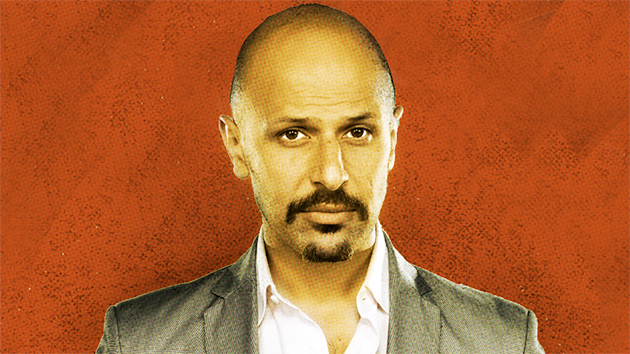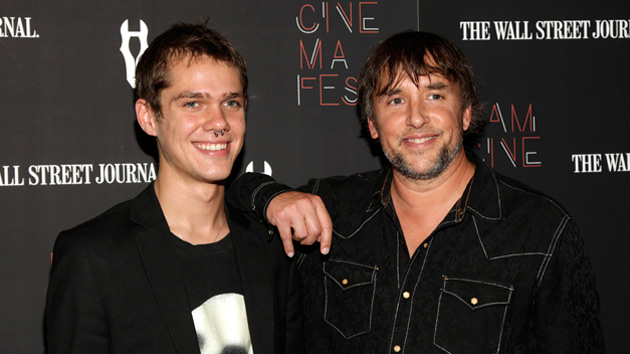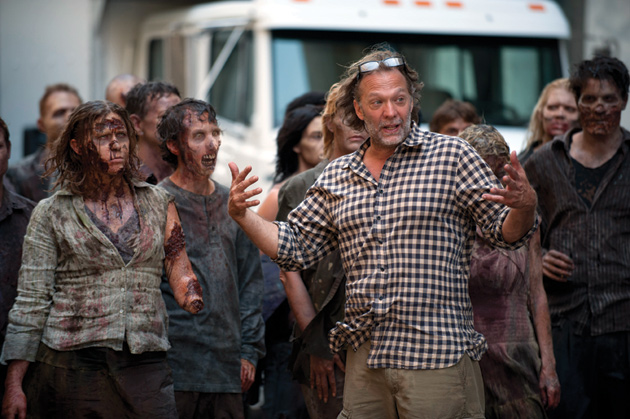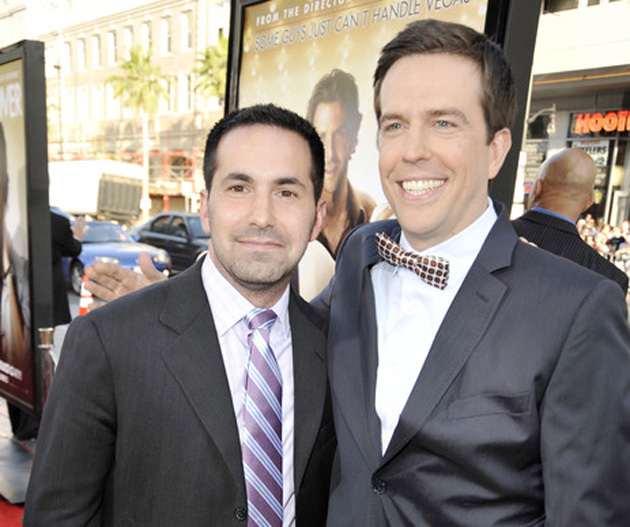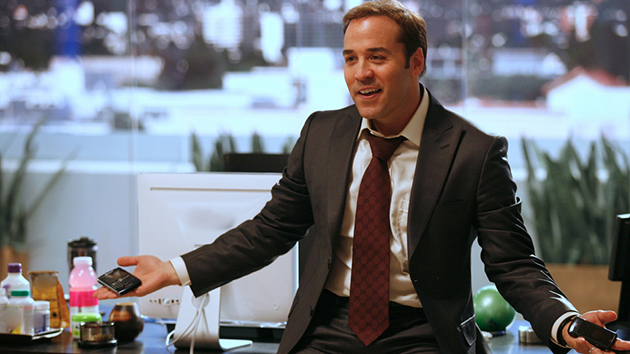
Piven totally owned the role of Hollywood's biggest shark.HBO
Jeremy Piven wants you to know he’s boring. Or, rather, he’s nothing like Ari Gold, the brash, utterly tactless, and ultimately hilarious Hollywood agent he portrayed over eight seasons of HBO’s Entourage—racking up three Emmys and a Golden Globe for best supporting actor.
Piven grew up a long way from Tinseltown. His parents were founding members of Chicago’s Playwrights Theatre Club—which spawned famed improv troupe the Second City—and the Piven Theatre Workshop, whose well-known alumni include the Cusack siblings, Aidan Quinn, Lili Taylor, and Piven himself. After earning a theater degree at Iowa’s Drake University, Piven, now 49, landed a series of small comedic parts in film and television, including serial gigs on Ellen and The Larry Sanders Show. But it was Entourage, inspired by the Hollywood escapades of executive producer Mark Wahlberg, that made him famous.
He reprises the Ari role in the Entourage movie, which hits theaters on June 3. But his main post-Entourage gig has been a starring role in the Masterpiece drama Mr. Selfridge, now in its third season. For his portrayal of a department store visionary, Piven had to summon his anti-Ari. “Ari Gold was all bark and no bite,” he told me. “Harry Selfridge is all bite and no bark.”
Mother Jones: Do you think the Entourage movie will appeal to people who’ve never watched the show?
Jeremy Piven: I saw a rough cut with a friend who had never seen the series and she loved it! That blew me away. Even though these characters are all based on real-life characters—Mark Wahlberg has an entourage—they’re all kind of archetypes. There’s that Johnny “Drama” character that everyone takes shots at, the ones who wear their hearts on their sleeves and are desperately trying to get ahead but can’t quite make it, the lethargic Turtles of the world who leech off others, and the overachievers—the Ari Golds of the world. So it works.
MJ: How close is Ari to his real-world inspiration, Rahm Emanuel’s kid brother?
JP: It’s not a biopic. Ari Emanuel is an incredibly ambitious, successful Hollywood agent from a family of overachievers. You take your cues from these people and then just use a lot of dramatic license.
MJ: Emanuel supposedly insisted that you get this part.
JP: What I heard was, they went to him with a list of actors and he thought I might be equipped to play the role. And that’s a compliment. The way I play Ari Gold is rooted in commedia dell’arte, an Italian form I studied with Tim Robbins. But none of this will ever make it into print! What’s interesting is, “Isn’t Jeremy Piven Ari Gold?” Ari Gold would have no patience for Jeremy Piven. Jeremy Piven is looking for a really cool project, an independent movie or a play or whatever. Ari Gold is looking for paydays.
MJ: I was actually going to ask how Ari would describe you.
JP: He would describe me as some ridiculous thespian that’s just, you know, “Go away!” [Laughs.] Ari is continuously looking for ways to make money. He lives in so many dualities: He loves his wife, he’s monogamous, yet he will look at every woman that passes by. His methods are unsound, but he’s trying to put food on the table for his family. So if you can play those dualities, it’s fun to play and fun to watch, and you can’t hate the guy. It gives him a certain license to be that reckless.
MJ: And Harry Selfridge?
JP: He’s the antithesis of Ari Gold. The way he runs his professional life is through love and treating every employee as an equal and inspiring everyone in London to be the best versions of themselves. He was a ray of sunshine and energy. Now, he’s much more of a disaster than Ari Gold. His ideology was, in terms of his professional life, spotless. But at night he was a slave to his urges and loved to gamble and cheat on his wife—Ari would never cheat on his wife. Going over to England and working with the best actors in the world and being a part of this incredible series seems like the best work of my life. It hasn’t really been seen here in the States to the level that Entourage was, but it’s a big hit, sold to over 160 countries. So when people see me overseas, they say, “Hey Mr. Selfridge!”
MJ: Do they know Entourage?
JP: Sure, but the way people approach you is different. You’re in people’s living rooms as this turn-of-the-century gentleman. And so they react to me differently than screaming, “Hey Ari, you’re such an asshole. Come here, you little asshole!”
MJ: You get that from fans?
JP: Yeah, listen, it’s your job to embrace your characters and give them every bit of energy and respect that you can muster. If people think you play something so authentically that you are that character then that’s a great compliment. You know, and then they meet me and they say, “Who is this? And why are you so calm? Are you stoned? [Laughs.] Like, no. This is actually who I am.
MJ: So what do you like about being famous?
JP: I’ll tell you what I love about it. I’m able to go back every year and help the Piven Theatre raise money, and that’s something that’s very real. It’s a not-for-profit and has kids on scholarship. They work with this great program called Off the Street Club where we bring in kids from the inner city and teach them improv and theme study and character work. That’s heavy, man! That’s amazing. These kids don’t have any reference for being an actor. And then they can go and have a real reference for it, and see how they interact creatively.
MJ: Growing up around all this creativity sounds magical to me.
JP: Well, the grass is always greener. I was playing high school football at the same time I was on the stage, so my life was a little bit of a hybrid. I was very lucky in that way. And you know, there aren’t any 5-foot-9 linebackers in the NFL, so there’s only so far I could’ve gone.
MJ: You’ve developed sort of a knack for playing obnoxious characters.
JP: When you grow up in Chicago and not LA, you don’t have a chance to audition for the bigger roles. You’re basically taking the scraps. For my first 20 or 30 movies, I was taking “best friend No. 3” and trying to make a meal out of it—like when Cameron Crowe calls and says, “There are no lines, but I want you to play the checkout guy in Singles, and just keep talking and have fun with it.” My stage life was completely different: I got to play incredible roles from literature, whereas in front of a camera I had to make something out of nothing. So that’s maybe where it came from.
MJ: Given your improv background, how much of Ari Gold’s dialogue was unscripted?
JP: [Entourage creator] Doug Ellin is a stickler for the words and his writing is so brilliant that it’s basically like doing your haftarah. You can’t improvise. (I’m sorry, that was a reference to my Bar Mitzvah—that was really strange.) If the world thinks it was improv, I’m very happy. The goal, every time you’re acting, is to make it look like it’s the first time you ever thought or spoke or did any of that.
MJ: When you play Mr. Selfridge, are there steps you take to distance yourself from Ari in the eyes of the viewers?
JP: Sure. Ari Emanuel is from Chicago. Harry Selfridge is from Wisconsin and made his bones in Chicago. I’m from Chicago, so they had me keep my accent. So it’s the same accent, but that’s where it ends. When they told me about Harry Selfridge’s life, I was blown away. I mean, you couldn’t make this up! To go from this reactive, completely emotionally invested Hollywood shark to a gentleman who genuinely loved his employees and led by example but had an incredibly colorful life, that was a no-brainer for me. I had no intention of doing TV after eight years of Entourage, but I couldn’t turn this down.
MJ: Has your career turned out substantially differently than you expected?
JP: None of it was premeditated. If you try to control your destiny, I don’t know how healthy that is. The type of acting I did at an early age was a combination of improv, theater games, and then also Salinger and Chekhov and Kurt Vonnegut. I guess I lived in a microcosm, so I thought the best thing was being on stage and getting paid, being an actor.
MJ: Which do you prefer: stage or screen?
JP: I love all the mediums, but you are what you are. I’m a physical, comedic stage actor, so I act head-to-toe. You’re always trying to fine tune it so that it fits to the screen. I did the original version of Fear and Loathing in Las Vegas on stage as Gonzo the attorney, and I played Methuselah the 900-year-old man when I was 24—people thought it was actually my father in the role, which was really fun. That’s where I probably thrive the most. I would love to get back to that.
MJ: What do you do when you’re not working?
JP: Well, I play the drums any chance I get. I have a set in London when I’m doing Mr. Selfridge. I think my neighbors hate me.
MJ: You have a band?
JP: Yeah. The rest of my guys are all real musicians. We hang out on Sundays and play covers—the Stones, Zeppelin, Tom Petty, Jimi Hendrix. It’s a blast.
MJ: What’s this I hear about you wanting to portray Keith Moon?
JP: Yeah. He was kind of the first real rock star: like a proper British gentleman during the day and then just a lunatic at night—incredibly reckless and brilliant at the same time. It would be fun to play him.
MJ: Is somebody planning a biopic?
JP: No. [Laughs.] Wishful thinking.
MJ: So, what are some roles you’ve turned down over the years only to regret it later?
JP: I haven’t been that lucky, my friend! There are roles I admire. I mean, you look at Birdman and you see how well-depicted that world is. To see that backstage life done so perfectly and brilliantly, to get that tone right, it was very inspiring.
MJ: The comedian John Oliver recently suggested uses for some of the excess rooms in the Turkish president’s 1,000-room mansion. One of them was a “Pivenary,” the world’s largest collection of photos of Jeremy Piven…outside of Jeremy Piven’s own home. Where did that joke come from?
JP: Does John Oliver know me? I’ve never met him. Listen, I played a character for eight seasons that represents a certain brash arrogance that exists in Hollywood, so when you take shots at that character the lines are blurred. You can’t take that stuff personally. The fact that I’m even on that guy’s radar is exciting.

